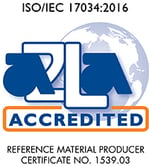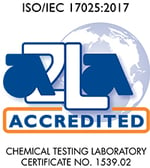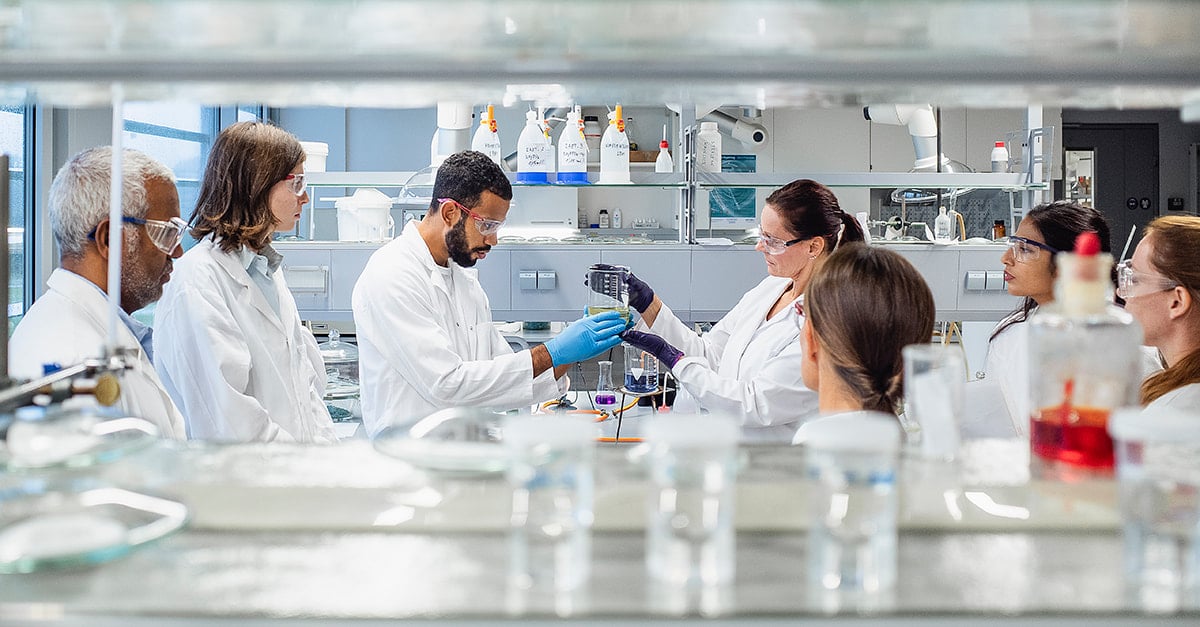To say that environmental laboratory quality assurance (QA) teams have a lot on their plates is an understatement. To name a few, they oversee method validation, review customer reports, verify proper lab accreditations, and ensure analysts follow internal work instructions.
One tool that QA teams use to ensure success for these responsibilities is analytical standards. While some labs may make their own standards in-house, most labs look to third-party standards to help manage and improve their QA program. These standards, or CRMs, are a key component of quality compliance and their implementation into laboratories eliminates decision fatigue while helping labs create robust QA programs.
CRM, RM, QC, What’s the difference?

 Quality Control samples (QCs), Reference materials (RMs), and certified reference materials (CRMs) are all important controls in quality assurance (QA) programs. While the terms often get lumped into the same category, the distinction between the three lies in their accreditation level. RMs are established homogenous standards used in the laboratory for calibration, calibration verification and for assigning values to materials. QCs also known as, check samples, are often internally verified and used for analytical system evaluation. QCs can also refer to the procedures that maintain consistent and accurate tests through equipment calibration and control samples. CRMs, on the other hand, meet all the requirements of a general RM with an additional certificate establishing metrological traceability and a statement of measurement uncertainty. This higher degree of confidence awarded to a CRM makes it highly accepted among accrediting bodies and the gold standard when it comes to accredited materials. In fact, the ISO 17025 standard states that, when available, CRMs shall be used for establishing metrological traceability of measurements.
Quality Control samples (QCs), Reference materials (RMs), and certified reference materials (CRMs) are all important controls in quality assurance (QA) programs. While the terms often get lumped into the same category, the distinction between the three lies in their accreditation level. RMs are established homogenous standards used in the laboratory for calibration, calibration verification and for assigning values to materials. QCs also known as, check samples, are often internally verified and used for analytical system evaluation. QCs can also refer to the procedures that maintain consistent and accurate tests through equipment calibration and control samples. CRMs, on the other hand, meet all the requirements of a general RM with an additional certificate establishing metrological traceability and a statement of measurement uncertainty. This higher degree of confidence awarded to a CRM makes it highly accepted among accrediting bodies and the gold standard when it comes to accredited materials. In fact, the ISO 17025 standard states that, when available, CRMs shall be used for establishing metrological traceability of measurements.
Why Incorporate CRMs Into My Quality Assurance Program?
‘Certified reference materials (CRMs), with their high level of documentation and traceability, allow ISO 17025 accredited labs to reduce errors and risk while improving the success of their quality assurance program. ’
- Craig Huff, senior technical managerCRM use in the analytical laboratory is multifunctional. Common uses include accuracy of digestion and extraction efficiencies, method validation, analyst competency, and corrective action.
Internal Digestion And Extraction Efficiencies
Prior to analyte analysis, laboratories must first perform internal digestion to separate analytes from matrices and extract analytes of interest for subsequent analysis. Only after these samples are extracted can laboratories determine extraction efficiency, or the recovered percentage of a desired analyte from a sample. The success of extraction efficiency relies heavily on accurate sample measurements. Without proper materials and standards, a laboratory may find itself reporting inaccurate measurements that wrongly quantify sample analytes and lead to inaccurate data. With the help of a CRM, laboratories can curtail the likelihood of calibration and sample measurement errors and instead, assure more precise and accurate analyte quantifications.
Method Validation
Before implementing a new method into their routine testing, laboratories must first verify that the proposed method meets all defined criteria. Method validation is a time-intensive, multi-step process. With more steps comes a greater chance of error, and the absence of CRMs poses the greatest threat of all to a robust method. Without CRMs, calibration standards may be incorrect, and samples may not be validated to the degree required. However, when CRMs are used, laboratories can isolate the issue and correct the misstep in their method. Additionally, laboratories making their own standards can have manufacturing biases in their production technique. Having an independently sourced CRM helps identify this internal bias and offers confidence in methods and calibration standards.
Beyond standard certificate of analysis (CoA) information, Waters ERA’s certificates also include performance acceptance limits based on historical proficiency testing data. This allows analysts to compare their results to historical data from years of proficiency testing user data.
Analyst Competency
CRMs are a useful tool in checking the progress of both new and experienced laboratory analysts. However, the absence of CRMs limits analyst error identification, performance improvement, and their overall ability to perform and record data from routine procedures. While CRMs may not be required for analyst competency, they are a worthwhile step in further ensuring data validity and monitoring performance.
Corrective Action
Inconsistency in laboratory results requires error identification and remediation. Even with a RM, it is quite challenging to troubleshoot and identify errors, as laboratory measurements cannot be benchmarked to certified values. Only external, third-party verified samples can reduce and help detect these errors, not to mention limit internal biases. The high confidence level included with CRMs allows laboratories to resolve deviations by identifying whether the source of error is instrument, measurement, analyst, or externally related. After identifying the root cause of error and implementing corrective action, CRM analysis can demonstrate that corrective action effectively resolved the source of error.
Summing Up the Value of CRMs
When it comes to establishing traceability and associated uncertainty in your standards, CRMs are the way to go. QA teams can use CRMs to provide accurate extraction efficiencies, create robust methods, monitor analyst competency, and implement corrective action. CRMs provide laboratories with the highest level of accreditation and confidence in the procedures they perform.
For more information
To learn more about CRMs please visit:
![]() Creating a Robust & Sustainable QA Program
Creating a Robust & Sustainable QA Program

